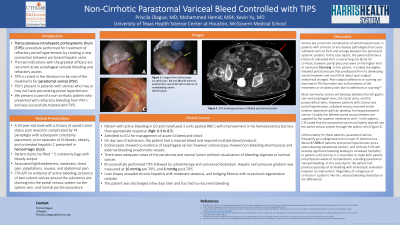Back


Poster Session A - Sunday Afternoon
Category: GI Bleeding
A0300 - Non-Cirrhotic Parastomal Variceal Bleed Controlled With TIPS
Sunday, October 23, 2022
5:00 PM – 7:00 PM ET
Location: Crown Ballroom

Has Audio

Priscila Olague, MD
UT HSC - Houston
Houston, TX
Presenting Author(s)
Priscila Olague, MD1, Mohammed Hamid, 2, Kevin K. Yu, MD1
1UT HSC - Houston, Houston, TX; 2UT HSC - Houston, Richmond, TX
Introduction: Transcutaneous intrahepatic portosystemic shunt (TIPS) is a procedure performed for treatment of refractory portal hypertension (pHTN). The two indications with the greatest efficacy are recurrent esophageal variceal bleeding and refractory ascites, however TIPS has also been noted in the literature to be one of the treatments for parastomal varices (PSV). PSV’s present in patients with stomas who may or may not have pre-existing pHTN. We present a case of a non-cirrhotic patient who presented with refractory bleeding from PSV and was successfully treated with TIPS.
Case Description/Methods: A 59-year-old male with a history of spinal tumor status post resection complicated by T4 paraplegia with colostomy placement, prior GI bleeds, obesity, and untreated hepatitis C presented in hemorrhagic shock with five bags worth of bloody ostomy output for the past day. Pertinent labs revealed a hemoglobin of 6.3 and lactic acid of 3.0. CTA A/P showed no evidence of active bleeding however noted the presence of pericolonic varices around the colostomy site draining into the portal venous system via the splenic vein, and normal portal vasculature. On day two of admission, the patient had a major bleed and required multiple blood products. Endoscopies showed no evidence of esophageal varices however colonoscopy showed non-bleeding diverticulosis and external bleeding anastomotic vessels. There were adequate views of the peristomal and stomal lumen without visualization of bleeding stigmata or luminal varices. IR consulted and successfully performed TIPS followed by sclerotherapy and variceal embolization of the pericolonic varices. Hepatic vein pressure gradient was measured at 10 mmHg pre-TIPS, and 6 mmHg post-TIPS. Liver biopsy revealed chronic hepatitis with moderate steatosis, and bridging fibrosis with occasional regenerative nodules. The patient was discharged a few days later with no recurrent bleeding.
Discussion: Varices are a complication of pHTN in patients with cirrhosis or pathologies that allow collateral veins to form and enlarge between the portal and systemic systems. In this case report, the patient had a history of untreated HCV, a risk factor for development of pHTN, and obesity, a recognized risk factor for PSV formation. Post-surgical adhesions or scarring can also lead to PSV formation. It is important to make patients and physicians aware of the risk factors and monitor for PSV formation.
Disclosures:
Priscila Olague, MD1, Mohammed Hamid, 2, Kevin K. Yu, MD1. A0300 - Non-Cirrhotic Parastomal Variceal Bleed Controlled With TIPS, ACG 2022 Annual Scientific Meeting Abstracts. Charlotte, NC: American College of Gastroenterology.
1UT HSC - Houston, Houston, TX; 2UT HSC - Houston, Richmond, TX
Introduction: Transcutaneous intrahepatic portosystemic shunt (TIPS) is a procedure performed for treatment of refractory portal hypertension (pHTN). The two indications with the greatest efficacy are recurrent esophageal variceal bleeding and refractory ascites, however TIPS has also been noted in the literature to be one of the treatments for parastomal varices (PSV). PSV’s present in patients with stomas who may or may not have pre-existing pHTN. We present a case of a non-cirrhotic patient who presented with refractory bleeding from PSV and was successfully treated with TIPS.
Case Description/Methods: A 59-year-old male with a history of spinal tumor status post resection complicated by T4 paraplegia with colostomy placement, prior GI bleeds, obesity, and untreated hepatitis C presented in hemorrhagic shock with five bags worth of bloody ostomy output for the past day. Pertinent labs revealed a hemoglobin of 6.3 and lactic acid of 3.0. CTA A/P showed no evidence of active bleeding however noted the presence of pericolonic varices around the colostomy site draining into the portal venous system via the splenic vein, and normal portal vasculature. On day two of admission, the patient had a major bleed and required multiple blood products. Endoscopies showed no evidence of esophageal varices however colonoscopy showed non-bleeding diverticulosis and external bleeding anastomotic vessels. There were adequate views of the peristomal and stomal lumen without visualization of bleeding stigmata or luminal varices. IR consulted and successfully performed TIPS followed by sclerotherapy and variceal embolization of the pericolonic varices. Hepatic vein pressure gradient was measured at 10 mmHg pre-TIPS, and 6 mmHg post-TIPS. Liver biopsy revealed chronic hepatitis with moderate steatosis, and bridging fibrosis with occasional regenerative nodules. The patient was discharged a few days later with no recurrent bleeding.
Discussion: Varices are a complication of pHTN in patients with cirrhosis or pathologies that allow collateral veins to form and enlarge between the portal and systemic systems. In this case report, the patient had a history of untreated HCV, a risk factor for development of pHTN, and obesity, a recognized risk factor for PSV formation. Post-surgical adhesions or scarring can also lead to PSV formation. It is important to make patients and physicians aware of the risk factors and monitor for PSV formation.
Disclosures:
Priscila Olague indicated no relevant financial relationships.
Mohammed Hamid indicated no relevant financial relationships.
Kevin Yu indicated no relevant financial relationships.
Priscila Olague, MD1, Mohammed Hamid, 2, Kevin K. Yu, MD1. A0300 - Non-Cirrhotic Parastomal Variceal Bleed Controlled With TIPS, ACG 2022 Annual Scientific Meeting Abstracts. Charlotte, NC: American College of Gastroenterology.
